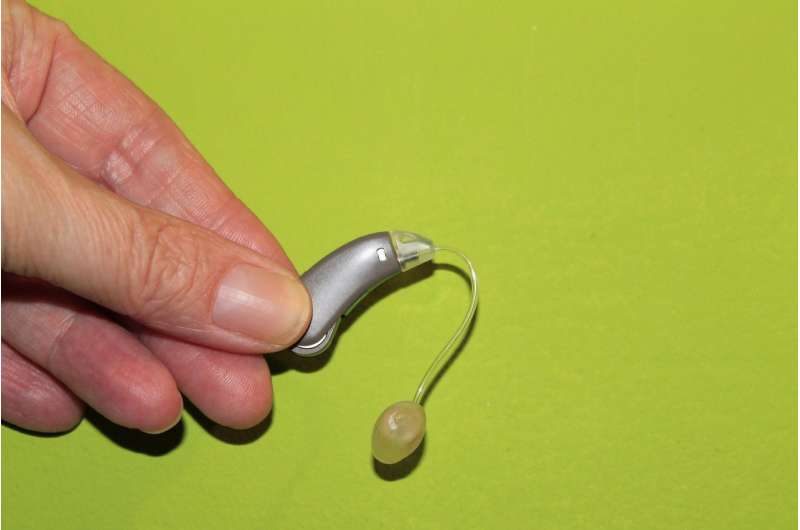
A team of researchers at the Ear Institute, University College London has found that the sound-processing algorithms used in hearing aids can degrade the ability of hearing-impaired people to discriminate sounds. In their paper published in the journal Nature Biomedical Engineering, the group describes their study of hearing aids using brain probes in gerbils. John Middlebrooks, with the University of California at Irvine has published a News & Views piece outlining the known problems with modern hearing aids and the work done by the team in England.
Prior research has shown that despite improvements over the past several decades, hearing aids are still not as effective at restoring hearing as many would hope, and many people prescribed hearing aids don't use them. As Middlebrooks notes, hearing aids are, at their most basic level, sound amplifiers. They accept sound via a microphone, boost its levels and then play the boosted sound through a speaker. In more recent times, hearing aids have been improved through the use of microcircuitry that provides wide dynamic range compression (WDRC)—technology that boosts softer sounds more than louder sounds in the hope of balancing out the sound that the person hears. In this new effort, the researchers have found that the reason WDRC technology fails to deliver intelligible, audible sound is because it fails to account for supra-threshold effects.
The work involved degrading the hearing abilities of test gerbils by blasting loud noise into their ears for a long period of time. They then surgically implanted probes into their brains (and the brains of gerbils with normal hearing to serve as controls) to measure hearing-related neural activity under different scenarios. In comparing neural sound processing of gerbils with normal hearing versus those with damaged hearing that were using hearing aids, the researchers found that the hearing aids did improve the strength of neural signals—but they also found that the patterns resulting from human speech were harder to distinguish, suggesting distortion. They found that removing the WDRC technology from the hearing aids improved hearing signals under quiet circumstances, but also found that the signals from sound that involved background noise were still distorted. They suggest that amplification of sound by hearing aids results in degradation of intelligibility. They further suggest that there is room for technological improvements, though a new perspective is likely required.
Explore further
© 2021 Science X Network
Citation: Sound-processing algorithms in hearing aidsdegrade ability to discriminate sounds (2021, May 10) retrieved 10 May 2021 from https://ift.tt/3xTyObk
This document is subject to copyright. Apart from any fair dealing for the purpose of private study or research, no part may be reproduced without the written permission. The content is provided for information purposes only.
"sound" - Google News
May 10, 2021 at 09:20PM
https://ift.tt/3xTyObk
Sound-processing algorithms in hearing aidsdegrade ability to discriminate sounds - Medical Xpress
"sound" - Google News
https://ift.tt/2MmdHZm
Shoes Man Tutorial
Pos News Update
Meme Update
Korean Entertainment News
Japan News Update

No comments:
Post a Comment